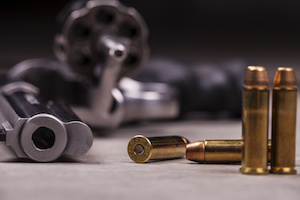Peggy Lee Shores has been charged in Rutland County, Vermont with murdering her husband. The defense argues that David Shores killed himself.
Relying on an expert opinion, the defense asked the court to dismiss the charge. The prosecution responded with the uncontroversial argument that conflicts in the evidence should be decided by the jury.
The prosecution then made the startling announcement that it intended to ask the court to exclude the expert’s testimony because he is “defense-friendly.” The prosecution’s belief that juries should decide conflicts in evidence is difficult to square with its belief that juries should never hear conflicting evidence presented by experts who testify for defendants.
Murder Prosecution
The only fact upon which the parties agree is that David Shores died from a gunshot wound in December 2016. In a 911 call, Peggy Shores told a dispatcher that her husband was carrying a gun up from the basement when he tripped on the stairs, landed on his elbow, and accidentally shot himself.
The wound was located on the upper left side of David’s body, below the collarbone. The police believed that the trajectory of the bullet was “consistent with” being shot at the bottom of the stairs by someone standing at the top of the stairs.
The state charged Peggy Shores with murder two months after David’s death. The charge was based on the assumed trajectory of the bullet and on the absence of a “contact wound” or gunshot residue on David’s body. The prosecution has cited no forensic evidence that links Peggy to the shooting.
David Shores’ family members are standing behind Peggy. They told prosecutors that nothing in their 38-year marriage suggested a reason for Peggy to murder David.
In the absence of witnesses or a clear motive, the forensic evidence alone seems insufficient to prove guilt beyond a reasonable doubt. The fact that a bullet trajectory might be “consistent with” one theory does not rule out its consistency with other theories. And whether a wound is a contact wound often depends on a subjective interpretation of inconclusive evidence.
The absence of gunshot residue on David’s hands or shirt does not prove that David was not holding the gun when it fired. Half of all individuals who commit suicide with a handgun do not have gunshot residue on their hands. Blood saturation and improper handling of clothing may remove any gunshot residue that was once present on the victim’s clothing.
In short, the evidence against Peggy is entirely circumstantial and far from conclusive. The prosecution’s inability to explain why Peggy would suddenly kill her husband — with a single shot, which would seem to rule out momentary rage — is likely to create a reasonable doubt at trial.
Defense Evidence
Since the prosecution’s case turns entirely on forensic evidence, the defense wisely retained a forensic expert of its own. The defense engaged the services of Chris Robinson, a forensic consultant who worked as a firearms examiner for the Atlanta Police Department and served as the Director of the Atlanta Police Crime Lab before forming his own company.
Robinson prepared a report concluding that David Shores “died as a result of self-inflicted gunshot wound to the chest.” On the strength of that report, Peggy Shores moved for dismissal of the murder charge.
The motion will almost certainly be denied. Criminal complaints are assessed to determine whether the facts alleged, if proved, would be sufficient to establish the charged crime. Unlike civil cases, in which a party can argue that undisputed facts entitle the defendant to a dismissal of the lawsuit, facts relied upon by the defense in a criminal prosecution cannot usually serve as grounds for dismissal prior to trial.
Robinson’s testimony may nevertheless prove vital at trial if it creates a reasonable doubt about the prosecution’s forensic evidence. Remarkably, the prosecution has stated that it will ask the court to bar Robinson from testifying.
Complaints About “Defense-Friendly” Evidence
The prosecution’s apparent theory is that Robinson should not testify because he “currently makes his living working as a paid-for-hire witness for defense attorneys” who has a “bias to produce a defense-friendly report.” All experts are paid — nobody works for free, including the government-employed experts who will testify for the prosecution — and the fact that an expert earns a living by providing expert services is not a ground to disqualify the expert.
The claim that Robinson’s report is “defense-friendly” is cheeky, since the prosecution will be relying on experts who always testify for the prosecution and naturally do so in a prosecution-friendly way. No expert would ever be called as a witness if the expert’s testimony did not assist the party calling the expert.
Robinson’s twelve years of law enforcement experience may insulate him from charges that he is “defense-friendly.” In any event, the prosecution’s attack goes to Robinson’s credibility, and credibility is up to the jury, not the judge, to assess. If the prosecution actually files the threatened motion to exclude defense evidence because it is favorable to the defense, the motion will be meritless.




